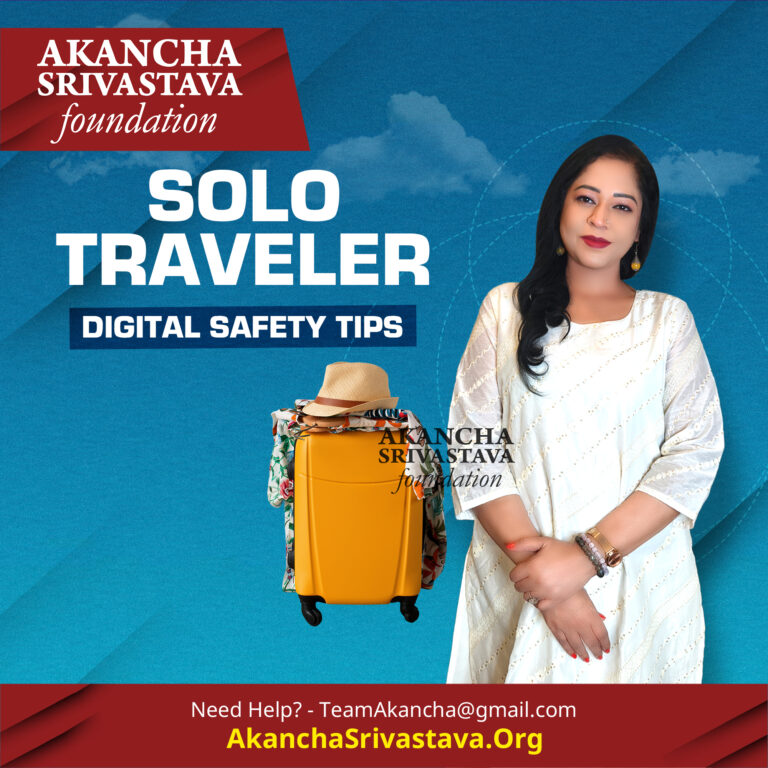Wander Safe, Stay Digitally Sharp!
Traveling solo is a powerful experience, it fosters independence, reflection, and confidence. But in today’s world, where tech meets travel, staying safe isn’t just about trusting your instincts—it’s about being digitally vigilant, too. Every time you share a location, post a story, or chat with a stranger, you’re leaving behind a digital breadcrumb trail. As cyber threats evolve, it’s crucial for travellers, especially solo explorers—to stay one step ahead. Here’s an essential guide to ensure your travel memories remain beautiful, not dangerous.
Real-World Scenario
A 25-year-old solo traveller in Southeast Asia frequently posted her real-time location and travel plans on Instagram Stories. One evening, she noticed a man at her hostel who seemed to be everywhere she went. After confronting the situation and checking her digital footprint, she realized he had been tracking her posts and had followed her across cities. Thankfully, local authorities intervened in time. But this could have gone very wrong. It’s a wake-up call: in the digital world, oversharing can attract silent predators.
- A solo traveller in Europe was tracked via her public Instagram stories, leading to stalking and harassment.
- In Southeast Asia, unverified ride-share drivers have impersonated professionals and taken detours into unsafe areas.
- Fake “hospitality” offers on travel platforms have resulted in scams and theft.
- In India, a woman solo traveller’s check-in photo was shared without consent by the hotel, attracting unsolicited visits.
Red Flags to Watch Out For
- Too Friendly, Too Fast:
Someone you just met offering to guide you or make plans? Pause. Over eagerness from strangers can sometimes signal bad intentions. - “Are You Alone?” – A Loaded Question:
Never reveal solo status. Use phrases like “My friends are nearby” or “I’m just waiting for someone.” Digital safety begins with limiting personal information. - Remote Areas with No Network? Rethink.
If a place is beautiful but desolate, and you have no signal—visit early and leave before dark. Carry offline maps and share your plans with someone you trust. - Suspicious Accommodations:
If your stay has poor security, creepy staff, or no emergency contact, leave immediately. A budget stay is not worth risking your safety. - Over-Inquisitive Strangers:
“Where next?” “Alone?” “Single or married?” You’re not obliged to answer. Redirect or shut down the conversation politely. - Unverified Transport Options:
Avoid random cab drivers with no ID or number plates. Use government-approved public transport or app-based taxis with tracking and SOS features. - Tired = Vulnerable:
Don’t make major decisions when fatigued. Most bad choices happen when we’re drained. Rest and recharge before acting. - Always Keep Someone Informed.
Share your travel plans, stay details, and itinerary with someone you trust. Send a daily message confirming when you’ve reached back safely at your accommodation. It’s not about being answerable, it’s about having a safety net. - Avoid No-Number or Over-Friendly Drivers.
Always book verified transport. A simple, uneventful cab ride is safer than an overfriendly one that turns tense.
Digital Safety Rules While Traveling
- Don’t Post in Real-Time:
Delay your posts. If you’re still at a location, don’t broadcast it. Predators monitor social media for patterns. - Limit Location Tags:
Disable automatic geotagging. Manually tag locations after you’ve left. - Secure All Devices:
Use strong passwords, biometric locks, and two-factor authentication. A lost phone shouldn’t become a lost identity. - Turn Off Auto-Connect:
Avoid connecting to open Wi-Fi. Disable Bluetooth and file sharing when not in use. - Use a VPN:
When accessing banking apps or logging into personal accounts on foreign Wi-Fi, a VPN adds a strong layer of protection. - Emergency Access:
Share your itinerary with someone trusted. Enable device tracking apps and save local emergency numbers.
Travel Tip for Women Travelers
Many predators lurk not just in streets, but also behind screens. Make sure your social accounts are private. If you’re part of women-only travel groups, ensure they’re verified and moderated. And never respond to unknown DMs, especially during your journey.
Travel is meant to be enriching—not alarming. Every smart choice you make today protects your tomorrow. Like, share, and subscribe to this channel to help others travel with confidence and safety. Your awareness might just save someone’s life.
Stay Aware, Stay Safe!
Jai Hind!
🔔 Subscribe for more cyber safety insights!
👍 Like, share & comment to spread awareness!
CONTACT US:
Website: www.AkanchaSrivastava.Org
Email: TeamAkancha@gmail.com
Twitter: @AkanchaS
Instagram: @akanchas
https://www.instagram.com/akanchas/
Facebook:
https://www.facebook.com/akanchasrivastava1
LinkedIn:
https://www.linkedin.com/in/akanchasrivastava/
ABOUT ‘AKANCHA SRIVASTAVA FOUNDATION’
The Akancha Srivastava Foundation is India’s leading social impact initiative dedicated to advancing cyber safety awareness and education. Established in February 2017, this not-for-profit Section 8 organization is a trusted voice in promoting safe online practices across the nation.
Distinguished Board of Advisors
Guided by an honorary advisory board of esteemed leaders:
- Former Special DGP RK Vij (Chhattisgarh Police)
- ADG Navniet Sekera (Uttar Pradesh Police)
- ADG Krishna Prakash (Maharashtra Police)
- Dr. Poonam Verma (Principal, SSCBS, Delhi University)
Our Mission
The Foundation is committed to educating, empowering, and building bridges between the public and authorities on critical cyber safety issues. Additionally, we specialize in forensics training for law enforcement, equipping them with the skills needed to tackle cybercrime effectively.

